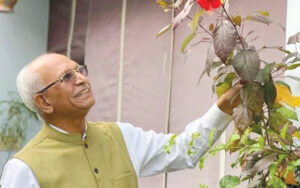Agro-ecological suitable and need based Crop Diversification to be promoted in the country
New Delhi: The country is maintaining an increasing trend in food grain production since 2015-16. This was stated by Secretary (Agriculture and Farmers Welfare), Manoj Ahuja during the inauguration of National conference on Agriculture for Rabi Campaign 2023-24 here.
In his address, Ahuja highlighted that as per 3rdAdvance Estimates (2022-23), production of foodgrains in the country is estimated at 3305 lakh tonnes which is higher by 149 lakh tonnes than the production of foodgrain during 2021-22. Record production is estimated of rice, maize, gram, pulses, rapeseed and mustard, oilseeds and sugarcane. Total pulses and oilseeds production during 2022-23 is estimated at record 275 and 410 lakh tonnes, respectively.
Read More: Rapid urbanization & biggest challenge: Bengaluru tackles plastic menace
Secretary said that total food grain production has increased by 31% in last 8 years from 251.54 to 330.54 million tonnes. Oilseeds and pulses have followed the same trend of Exports of agricultural products (including marine and plantation products) for the year 2022-23 which have crossed USD 53.145 billion, highest level ever achieved for agricultural exports. This achievement over the past two years will go a long way in realizing the Prime Minister’s vision of improving farmers’ income.
The objective of this conference is to review and assess the crop performance during the preceding crop seasons and fix crop-wise targets for rabi season in consultation with State Governments, ensure supply of critical inputs and facilitate adoption of innovative technologies with a view to enhance production and productivity of the crops.
Read More: Cold Chain Conclave in Himalayas: NCCD paves the way for J&K’s economic boom
The priority of government is agro-ecological based crop planning for diversion of land from excess commodities like rice and wheat to deficit commodities like oilseeds and pulses and high value export earning crops. 1st National Conference of Chief Secretaries at Dharmshala under the Chairmanship of Prime Minister has set the agenda for crop diversification and self sufficiency in pulses and oilseeds in consultation with states. This conference will take the agenda towards logical conclusion.
Millets were an active component during India’s G20 Presidency, as part of gift hampers, exhibitions and meals across meetings through IYM 2023. A visit of Spouses of G20 leaders was organized at IARI campus, PUSA on 9 September 2023 during which millet startups, farmers and live cooking dishes garnered central focus.
National targets for total food grains production has been set at 3320 lakh tonnes for the year 2023-24, rabi season will contribute 1612 lakh tonnes out of this. Similarly share of rabi crops will be 181 out of 292 lakh tonnes for pulses and 145 out of 440 lakh tonnes for oilseeds. The strategy would be to increase area through inter-cropping and crop diversification and productivity enhancement through introduction of HYVs and adoption of suitable agronomic practices in low yielding regions.
Read More: 13- year old Sunidhi from Rajasthan sows seeds of sanitation into her peers’ hearts and minds
Mustard production has jumped by 37% from 91.24 to 124.94 lakh tonnes in last 3 years. The productivity saw 7% jump from 1331 to 1419 kg/ha. The area under rapeseed & mustard increased by 28% from 68.56 in 2019-20 to 88.06 lakh ha in 2022-23. The farming community and the State Governments deserve special appreciations for this commendable achievement. Increased mustard production is helping to tide over some of the crisis being faced in imports of palm and sunflower oil.
All technical and input related issues concerning rabi season were deliberated in details. Secretary, Fertilizers, Rajat Kumar Mishra stressed on need of timely supply of fertilizers. He shared various steps taken by Fertilizer department to ensure timely supply of fertilizers. Secretary (DARE) and DG, ICAR, Dr. Himanshu Pathak highlighted need for adopting climate resilient practices. He presented global perspective of climate change and adaptation strategies being put in place. Indian experience of combating climate change was shared by NICRA team. Large number of studies conducted under NICRA project have identified climate resilient technologies for different agro-ecological regions.
Read More: Swachhata Ki Train: Ahmedabad embarks on innovative journey towards Swachhata
The conference raised concern at large yield gaps in crop production with farmers practice compared to improved technologies. JS (Crops & Oilseeds), Smt. Shubha Thakur gave vision for pulses and oilseeds for next 5 years to make country self sufficient in these commodities. For pulses, it is proposed to achieve the target of 325.47 lakh tonnes by 2025. Special projects like inter-cropping, targeting rice fallows, expansion in high potential districts and non-conventional regions will bring additional area under oilseeds. All this will increase domestic production of annual edible oilseeds from current level of 362 to 541 lakh tonnes and edible oil production from 85 to 136 lakh tonnes by the end of 2025-26. The renewed focus will help in reducing the import dependency from 56% to 36% in next 5 years. Additional Secretary (Agriculture) and senior officers from DA&FW, ICAR and officers of different State Governments participated in the National Conference.
Read More: Integrated Pest Management in Floriculture and Major Insect-Pests of Rose & Their Management

















